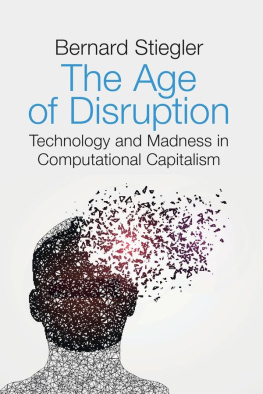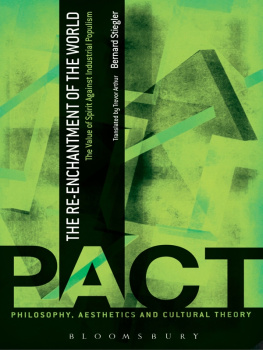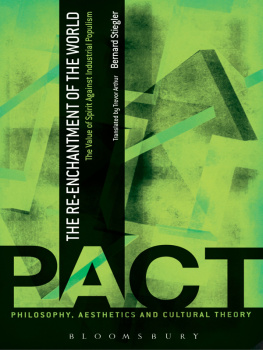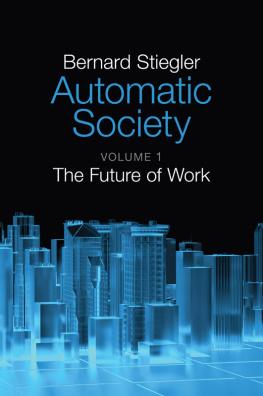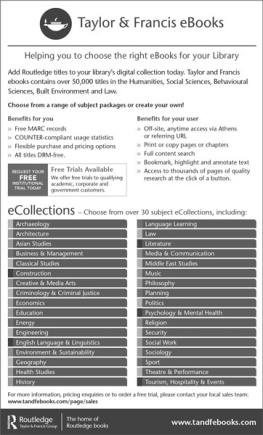Dedication
To the memory of Grard Granel and Nicolas Auray.
For Thomas Berns.
For Michel Deguy.
For the animals of the forest.
The Age of Disruption
Technology and Madness in Computational Capitalism
Bernard Stiegler
followed by
A Conversation about Christianity
with Alain Jugnon, Jean-Luc Nancy and Bernard Stiegler
Translated by Daniel Ross
polity
Copyright page
First published in French as Dans la disruption. Comment ne pas devenir fou? Les Liens qui Librent, 2016
This English edition Polity Press, 2019
This book is supported by the Institut franais (Royaume-Uni) as part of the Burgess Programme

Polity Press
65 Bridge Street
Cambridge CB2 1UR, UK
Polity Press
101 Station Landing
Suite 300
Medford, MA 02155, USA
All rights reserved. Except for the quotation of short passages for the purpose of criticism and review, no part of this publication may be reproduced, stored in a retrieval system or transmitted, in any form or by any means, electronic, mechanical, photocopying, recording or otherwise, without the prior permission of the publisher.
ISBN-13: 978-1-5095-2926-1
ISBN-13: 978-1-5095-2927-8 (pb)
A catalogue record for this book is available from the British Library.
Library of Congress Cataloging-in-Publication Data
Names: Stiegler, Bernard, author.
Title: The age of disruption : technology and madness in computational capitalism / Bernard Stiegler.
Description: English edition. | Medford, MA, USA : Polity Press, [2019] | Includes bibliographical references and index.
Identifiers: LCCN 2018046809 (print) | LCCN 2018050869 (ebook) | ISBN 9781509529292 (Epub) | ISBN 9781509529261 | ISBN 9781509529278 (pbk)
Subjects: LCSH: Technological innovations--Social aspects. | Capitalism--Social aspects. | Computers and civilization.
Classification: LCC T14.5 (ebook) | LCC T14.5 .S747 2019 (print) | DDC 303.48/3--dc23
LC record available at https://lccn.loc.gov/2018046809
Typeset in 10 on 11 Sabon
by Fakenham Prepress Solutions, Fakenham, Norfolk NR21 8NL
Printed and bound in Great Britain by TJ International Limited
The publisher has used its best endeavours to ensure that the URLs for external websites referred to in this book are correct and active at the time of going to press. However, the publisher has no responsibility for the websites and can make no guarantee that a site will remain live or that the content is or will remain appropriate.
Every effort has been made to trace all copyright holders, but if any have been overlooked the publisher will be pleased to include any necessary credits in any subsequent reprint or edition.
For further information on Polity, visit our website: politybooks.com
InchAllah is a French transcription of the Arabic phrase (In Shaa Allah), which means God willing. In Arab countries this term is used by Christians and Muslims with the same meaning, as inspired by the epistle of James: If the Lord will, we shall live, and do this, or that (James 4:15).
Muslims believe it is obligatory to pronounce this formula when they evoke an action to be realized in the future. This belief is founded on the reading of the Srat al-Kahf (The Cave):
23. Do not say of anything: I will do it tomorrow.
24. Without adding: If Allah wills. When you forget, remember your Lord and say: May Allah guide me and bring me nearer to the truth.
The expression is also used more generally to mark the desire and the hope to see realized an event in the future, equivalent to current secular sayings such as touch wood or fingers crossed.
There is also the expression Maa Shaa Allah ( ), which means approximately, as God has willed.
Finally, another expression, Law Shaa Allah, meaning If God wills/wishes, is used to express a desire or wish that cannot be reached.
The Portuguese word oxal and Castilian ojal, meaning Hopefully, are both derived from the Arabic Inshallah.
French Wikipdia
We should [] deny our We and draw from this, not foreseeable dissolution, but a burst of refounding lucidity. We need to confront its defeat because it is formed in exaltation, and, each time, in forgetting that it is highly perishable, which does not mean that it is illusory. We, here, fall into silence and contemplate an abyss. We close our eyes and clench our teeth in order to avoid having to uselessly pronounce: Who am I? We know that it would destroy that for which it asks. We think that our We should choose collective union in despair, but can we make despair a combative bond?
Bernard Nol
And, after Solons speech denouncing what is taking place and criticizing his fellow citizens, the Council replies that in fact Solon is going mad (mainesthai). To which Solon retorts: You will soon know if I am mad when the truth comes to light.
Michel Foucault
But we are probably speaking at cross purposes and it will take centuries before our differences are settled.
Sigmund Freud to Ludwig Binswanger
, , ,
.
Pindar
Now you ask nothing more because you have nothing more
apart from what you remember.
Derya
(at the slam workshop held in the Glacis housing project, Belfort, and led by Dominique Bourgon)
Notes
Bernard Nol,
Monologue du Nous (Paris: P.O.L., 2015), pp. 910. Michel Foucault,
The Courage of Truth (The Government of Self and Others II): Lectures at the Collge de France, 19831984, trans. Graham Burchell (New York: Palgrave Macmillan, 2011), p. 77. Sigmund Freud and Ludwig Binswanger,
The Sigmund FreudLudwig Binswanger Correspondence, 19081938, trans. Arnold J. Pomerans (London: Open Gate Press, 2003), p. 212.. See ch. 7, n. 17.
Part One
The Epokh of My Life Philosophizing So as Not to Go Mad
Disruption: A New Form of Barbarism
1. The loss of reason
At 4:30 p.m. on 11 September 2001, I began delivering a lecture at the Universit de technologie de Compigne in which I introduced the theme of the industry of cultural goods, formulated by Theodor Adorno and Max Horkheimer in 1944 in a text that, in 1947, became the chapter of Dialectic of Enlightenment entitled The Culture Industry.
On 11 September 2001, between 4:30 p.m. and 5:00 p.m., I began explaining to my students that the world that took shape after the Second World War, a world that took the American way of life as its model, a world globally rationalized and Westernized, was, according to Adorno and Horkheimer, actually in the course of losing its reason. I emphasized the remarkable foresight of these two German philosophers: taking refuge from Nazism in the United States, they saw this new kind of barbarism emerging even before the end of the Second World War, first in New York, and then in California. I then drew their attention to the following three points:
- in 1997, fifty years after the publication of Dialectic of Enlightenment, it was estimated that the world contained one billion television sets;
- on 3 April 1997, the US Federal Communications Commission (FCC) announced that the federal government would in 2006 shut off the analogue frequencies that were currently being used by 3,800 American radio and television stations, all of whom were advised to switch to digital by 2003;
- in the spring of 1997, Craig Mundie, then a senior vice-president at Microsoft (a company represented on the board of the FCC), declared during a European visit that his company, which at that time dominated the information industry (now called the digital industry), would launch a bid to dominate the multimedia business, taking advantage of the opportunity presented by the convergence of information, media and telecommunications technologies.

